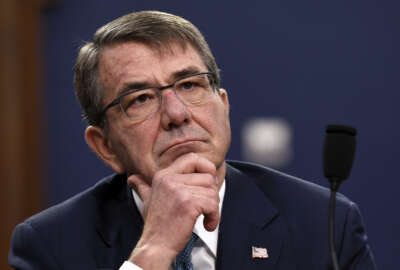
Is Force of the Future back from the dead?
The Joint Chiefs of Staff are rehashing some controversial personnel reform ideas from the Obama administration.
One of the most controversial military personnel reforms in recent years may be rising from the dead within military leadership.
The Force of the Future initiatives are being rehashed in the email chains of the Joint Chiefs of Staff, said Air Force Maj., a special assistant to the Joint Chiefs of Staff during the May 12 Defense Entrepreneurs Forum DEFxDC conference in Washington.
“I just the other day was able to get on an email chain where they recirculated the Force of the Future report amongst the Joint Staff to inform [leadership] issues,” Krieger said.
DEF had a hand in formulating the Force of the Future plans and finding a champion in Brad Carson the former acting defense undersecretary for personnel and readiness.
Former Defense Secretary Ash Carter took up the mantle for the reforms and pushed them during his tenure to retain and recruit new talent to the military.
“There’s value in the Force of the Future report. There is data, there are anecdotes, there are solution sets and framing constructs that people are finding useful. Now that some of the emotion has drained from the conversation, people are returning to it with a fresh eye and they’re recognizing the value added of that report,” Krieger said. “It was a fairly fraught conversation when it first came out and the brilliance of the military is everyone moves on.”
Many thought the Force of the Future was dead after President Donald Trump was elected. Republicans were critical of the reforms, which ranged from extending maternity leave for women to creating public-private work partnerships for DoD employees to letting transgenders serve openly in the military.
“Many of these Force of the Future proposals appear to be solutions in search of a problem,” Senate Armed Services Committee Chairman John McCain (R-Ariz.) said last year. “I find it deeply disturbing that you are proposing to add expensive fringe benefits allegedly aimed at retention during a time when we are asking 3,000 excellent Army Captains to leave the service who would have otherwise chosen to remain on active duty. From my perspective, this initiative has been an outrageous waste of official time and resources during a period of severe fiscal constraints. It illustrates the worst aspects of a bloated and inefficient Defense organization.”
Sen. Michael Lee (R-Utah) said he heard soldiers say they are more worried about equipment and training than personnel issues.
“I’ve never once heard somebody say I was going to go into the military, but I’m not going to because DoD is not the world’s most progressive employer,” Lee said during the Feb. 25 hearing.
The military is losing some of its best talent, however. The Air Force is short, by some estimates, more than a thousand pilots, the Navy is lacking nuclear qualified officers and the Marines are in need of sniper scouts.
“If the military is going to recruit and retain a volunteer force with the necessary skills, it needs to do two things. It needs to recruit, assign and promote in a way that develops and retains value across a wide range of skills including the highly technical skills, and it needs to better accommodate the evolution of American society and the American family. And it needs to do those things without sacrificing the aspects of the system that are working well,” former Sen. Jim Talent told Congress earlier this month.
In order to do that, DoD needs someone in charge of personnel. Right now, it only has a place holder. The job of undersecretary of defense for personnel and readiness is still without a nominee and its duties are performed by Anthony Kurta, the deputy assistant secretary of defense for military personnel policy.
“Everyone that hits the front page of the New York Times, I would say 75 percent of it. If it doesn’t have to do with readiness and some brigade that deployed without the right equipment and right now Congress is upset. Every other issue is personnel and readiness related. … The impact [of no one filling the position] is decisions are not being made,” said Morgan Plummer former senior adviser to the undersecretary of defense for personnel and readiness and now senior adviser to MD-5 National Security Technology Accelerator. “The impact is things are on ice … because [Kurta] is a career civil servant and by design is not supposed to be making controversial policy decisions because that is the purview of the administration.”
Plummer said right now policy decisions are not being made on things that effect individuals’ lives.
Copyright © 2025 Federal News Network. All rights reserved. This website is not intended for users located within the European Economic Area.
Scott Maucione is a defense reporter for Federal News Network and reports on human capital, workforce and the Defense Department at-large.
Follow @smaucioneWFED





